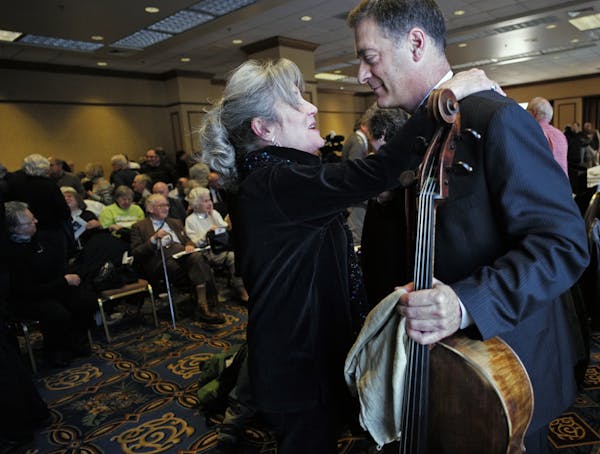The Guthrie Theater announced Monday that it lost nearly $438,000 in the year ended Aug. 31, the theater's first operating deficit in 19 years.
"We didn't reach the box office goals we set," Guthrie director Joe Dowling said. "We're still very healthy, but clearly a deficit is not a happy thing for any arts organization."
The Guthrie saw significant declines in season-ticket and single-ticket sales, which contributed to overall attendance of 375,702, a drop of 50,000 from fiscal 2011-12.
While other Twin Cities area arts organizations have had their ups and downs — including major losses the past two years by the Minnesota Orchestra — the Guthrie has been remarkably consistent under Dowling's stewardship since 1995.
Dowling said the Guthrie took several programming risks in its 50th anniversary year. In general, the risks did not work out financially. A festival of work by British playwright Christopher Hampton, which started the year, did poorly at the box office, as did "A Long Day's Journey Into Night" and "The Primrose Path."
Among the winners were "Pride and Prejudice," featuring "Mad Men" actor Vincent Kartheiser, "Clybourne Park" and "The Servant of Two Masters." A new piece by actor Mark Rylance, "Nice Fish," also did well.
"To have Mark Rylance back — he's becoming something of a regular with us — to create this piece, I was blown away by that," Dowling said. Rylance, the British actor who has won two Tony Awards, is currently on Broadway.
Dowling indicated his greatest regret of the season was the attendance for "A Long Day's Journey Into Night," which he directed.
"Helen Carey gave a monumental performance, and it's sad that it was not seen by the multitudes," Dowling said.
The theater last had an operating deficit in 1993-94 — an $18,203 shortage that followed a $438,000 loss the year before. The Guthrie reported a deficit of about $68,000 in 2008-09, but operating revenue actually outpaced expenses by $28,000 that year, a surplus erased by $96,000 in capital expenses.
Last year's deficit would have been significantly worse but for two factors: expense cuts of $1.1 million during the year, and donations that were up nearly 10 percent from the previous year. Dowling said salary reductions, trims in production budgets and "tightening of the belt all around" were made.
Softer ticket sales were not the sole factor in the 17 percent drop of earned income to $14.8 million. Most significantly, the Guthrie received considerably less money through "commercial enhancements." Previous seasons have benefited from these arrangements, in which a producer uses the Guthrie to prepare a show for a commercial run on Broadway or elsewhere. Two examples from 2011-12 were the Judy Garland story "End of the Rainbow" and "Roman Holiday."
Meanwhile, total contributions were $9.8 million, up nearly $1 million from the previous year. Dowling said much of that was related to the 50th anniversary programming. The organization drew a little more than $2 million from its endowment, roughly the same as the previous year. Meanwhile, the value of that fund grew 8 percent to $45,662,969.
Season subscriptions continued their decline — a trend that has been nearly universal in the arts community nationwide as patrons make spot decisions on when and where to attend. There were 17,225 season subscribers in 2012-13. In comparison, that figure was nearly 32,000 in 2000.
"It's something I've been saying for years," Dowling said. "We've got to prepare ourselves for a generation for which that subscription model doesn't work."
Graydon Royce • 612-673-7299

Minnesota Sports Hall of Fame: A class-by-class list of all members

This retired journalist changed professional wrestling from Mankato

